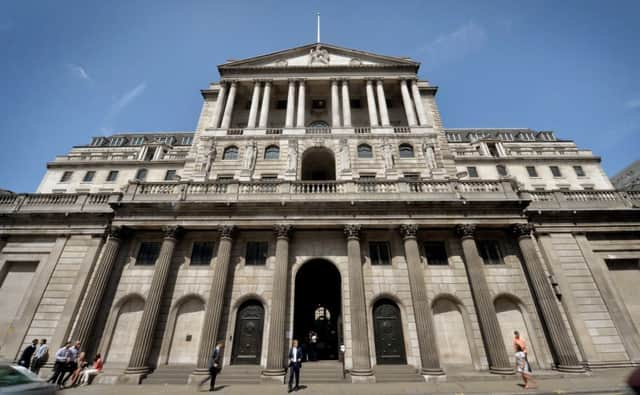Inflation dips to minus figures: Q&A on what it means


Inflation fell to -0.1 per cent in April, the first time in negative territory since 1960.
The figures underline the likelihood that the Bank of England will keep the base rate at its historic 0.5 per cent level, where it has been since March 2009, for the remainder of this year at least.
Advertisement
Hide AdAdvertisement
Hide AdEconomists yesterday insisted that negative inflation was unlikely to turn into dangerous deflation and the likelihood of mortgage rates remaining low for longer combined with lower food and oil prices would help strengthen consumer confidence and lift the economy.
Inflation is expected to rise again in the second half of the year as the oil price stabilises but not sharply enough to force the Bank of England into action on interest rates.
Rain Newton-Smith, director of economics for the employers organisation CBI, said: “With inflation set to remain below one per cent this year, a rise in interest rates any time soon seems off the cards.”
Food prices fell three per cent year on year in April, the fourth month of deflation at around that level - an unprecedented run of prices falling at such a pace in the sector.
Advertisement
Hide AdAdvertisement
Hide AdFuel prices rose on the month, with a litre of petrol 2p more expensive than in March, meaning its downward pull on the year-on-year rate was smaller than before.
While welcome in the short term, a prolonged period of deflation would pose significant risks to the economy as consumers would begin to put off spending money in the belief that goods and services would be cheaper in the future.
Chris Williamson, chief economist at financial services information firm Markit, said: “Alongside falling unemployment, low prices, especially for fuel, have boosted consumer spending, which is consequently providing the main thrust to economic growth at the moment.
“Further weak inflation numbers are to be expected in coming months, but any dip into deflation is likely to be short-lived, and the UK shows few signs of sinking into a Japanese-style deflationary slump.”
Advertisement
Hide AdAdvertisement
Hide AdChancellor George Osborne said: “As the governor of the Bank of England said only last week, we should not mistake this for damaging deflation.
“Instead we should welcome the positive effects that lower food and energy prices bring for households at a time when wages are rising strongly, unemployment is falling and the economy is growing.
But Labour sounded a note of caution over the figures and the underlying strength of the economy.
Shadow Chancellor Chris Leslie said: “Any relief for households is welcome, but this month’s figures reflect global trends and doesn’t change the reality that many are still struggling to pay the bills.
Advertisement
Hide AdAdvertisement
Hide Ad“The Government must clearly guard against the risk that business investment might be deferred. We need stronger action now to raise productivity to deliver sustainable growth and rising living standards.”
TUC general secretary Frances O’Grady said: “The first period of negative inflation in over half a century could turn out to be the canary in the mine, signalling that there’s something very wrong with the recovery.
“And with the threat of deflation set to continue, the Chancellor’s plans for extreme cuts risk putting the economy into more serious trouble.”
Q&A: WHAT DOES NEGATIVE INFLATION MEAN?
• Has this ever happened before?
CPI has never turned negative since comparable records began in 1989. According to an experimental data series by the Office for National Statistics (ONS) going back to 1950, it was last negative, at minus 0.6%, in March 1960.
• Would it mean the pound in my pocket is worth more?
Advertisement
Hide AdAdvertisement
Hide AdYes. CPI at minus 0.1% means a basket of goods worth £100 a year ago now costs £99.90. Low inflation has been driven by falling petrol and grocery prices.
• Is there a downside?
Sustained falling prices could mean shoppers putting off purchases and firms delaying investment, while mortgages become less affordable, especially if wages drop. But this is thought unlikely, with temporary causes such as low oil prices likely to fade.
• How will this affect interest rates?
The Bank of England must try to return inflation towards its target of 2% so low CPI should mean rates at 0.5% for longer. Deeper or more prolonged negative inflation could create growing speculation of interest rates being cut even further.
• How long will this period of deflation last?
A rebound in oil prices and the stability of global food prices mean it is likely to be short-lived. Tom Stevenson, investment director at Fidelity Personal Investing, said: “Households should enjoy the cheaper cost of living and real earnings growth while it lasts. Inflation is expected to pick up towards the end of the year.”